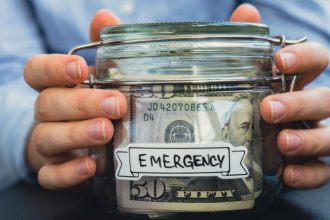Credit Sesame explains how to get debt under control, ease money-related anxiety, and take steps that could support your credit health over time.
Living with debt can take a toll on more than your bank account. It can create ongoing stress, keep you up at night, and make it harder to plan for the future. But even if your situation feels overwhelming, there are ways to reduce the pressure.
These 10 practical steps may help you get debt under control — and in the process, bring more peace of mind. As a bonus, some of these changes might also support better credit over time.
1. Make a complete list of what you owe
It’s hard to tackle debt when it’s unclear where you stand. Start by listing every debt — credit cards, loans, overdue bills — along with balances, interest rates, and minimum payments. Having everything in one place can reduce anxiety and help you see what needs attention first.
2. Create a realistic monthly budget
A workable budget can relieve stress by giving you more control. Track your spending and look for places to cut back, even temporarily — like unused subscriptions or frequent takeout. Freeing up even a small amount may help you make meaningful progress.
3. Prioritize high-interest debt
Tackling the highest-interest debt first (known as the avalanche method) might reduce the interest you pay overall. Over time, that could ease financial strain and help your payments go further.
4. Consider the snowball method for momentum
Prefer a quick win? Paying off the smallest balance first (the snowball method) can create a sense of accomplishment and build motivation. Either approach could reduce stress — choose the one that fits your mindset and money habits.
5. Automate your payments
Late payments can lead to fees, stress, and potential credit harm. Setting up automatic payments for at least the minimum amount can help you stay on track and avoid last-minute scrambles.
6. Explore refinancing options
If high interest makes it hard to keep up, refinancing might help. Balance transfer credit cards, personal loans, or home equity loans could offer lower rates, reducing pressure in the short term. Just be sure you understand the terms and have a repayment plan. The Federal Trade Commission’s (FTC) Coping With Debt guide outlines several options.
7. Contact lenders before you fall behind
Some may offer hardship programs, deferments, or adjusted payment plans. For more information, the Federal Trade Commission’s (FTC) guide on How To Get Out of Debt offers helpful strategies and considerations.
8. Use windfalls wisely
Unexpected money — like tax refunds, bonuses, or gifts — can be an opportunity. Applying it to debt could lower your balance, reduce interest, and give you breathing room. Even small lump sums might make a difference.
9. Monitor your credit regularly
Checking your credit may help you spot problems early and track progress over time. It might not relieve stress immediately, but learning how credit scores work, staying informed can give you a sense of control, and over time, improved credit may open the door to lower rates. You can also explore FTC resources on credit and debt to understand better how credit works.
10. Avoid adding new debt
If you’re trying to regain control, avoiding new debt is key. That might mean pausing large purchases or being mindful about credit card use. Keeping balances low can help reduce stress and benefit your credit later.
How to stay ahead of changing rates
Rising interest rates and economic uncertainty can make it harder to pay down debt and easier to feel overwhelmed. But you have options. By organizing your finances, trimming interest costs, and building healthy habits, you may reduce financial stress and set yourself up for stronger credit in the future.
If you enjoyed 10 ways to get debt under control and reduce financial stress you may like,
Disclaimer: The article and information provided here are for informational purposes only and are not intended as a substitute for professional advice
Read the full article here















